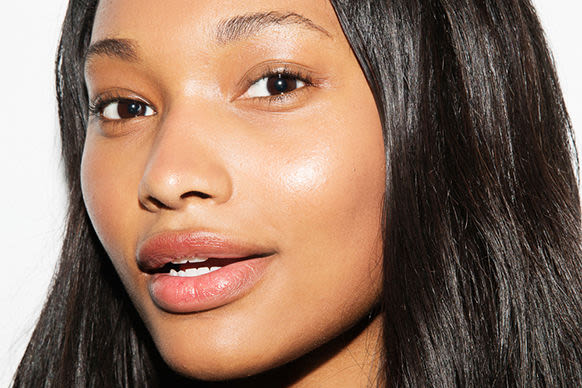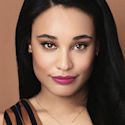There’s no denying that K-beauty, the term for beauty products and routines originating in South Korea, has found mainstream success in U.S. markets. Slice Intelligence estimates that sales for the category have increased 300-percent since 2015. It’s everywhere, from Sephora to Duane Reade. Even your phone yields proof of its ubiquity, where sheet masks, a tenet of K-beauty, are meme'd and photographed over and over, for all of Instagram to see.
It makes sense—the colorful, cutesy packaging is a draw in and of itself—and because you have to set aside a decent amount of time to actually perform the 10-step or so daily regimen (essences, serums, and ampoules abound), it feels indulgent yet relaxing. More important: it seems to work? It doesn't exactly take much effort to stumble upon glowing testimonials from hydrated, happy customers at every turn. But for someone with darker skin, it can feel exclusionary.
A quick Google image search of the term K-beauty better explains why. There, I count one, two...maybe three Black women? And that’s based on results from today—the images that populated my screen several years ago, when I first began my K-beauty journey, were even more starkly homogenous. I know K-beauty’s transpacific origin can account for its diversity vacuum (Seoul isn’t exactly known for its outsize Black population), but Chloe from two years ago—curious and completely green to the category—really needed a navigator with a similar skin tone.
It wasn’t just a mental hurdle that I was looking to overcome. Although, trying out a new routine that seemingly doesn’t speak to people who look like me is a hurdle. But what concerned me most stemmed more from a practicality perspective. Would these products even work on me? Would they work well with my darker skin tone, which is more likely to experience hyperpigmentation and skin sensitivity because of its melanin abundance? Was I even welcome in this space, what with so many K-beauty products advocating their “whitening” prowess?
“I believe there has been a misconception surrounding K-beauty,” Charlotte Cho, founder of K-beauty retailer Soko Glam told me after I dumped all my K-beauty worries onto her. “Oftentimes terms like ‘whitening’ have been used in K-beauty to describe products or ingredients. In K-beauty, the term whitening is synonymous with brightening, not with physically altering the color of the skin.”
While the “lost in translation” explanation could speak to product copy, I still wanted someone, anyone, to tell me what would work well for the specific case of my brown skin. It was when I looked to influencers in the space who shared a similar or darker skin tone that I found my gold mine. Their product reviews informed me, made me feel comfortable. Ultimately they assuaged my K-beauty anxieties and I hit the ground running. I’ll walk you through my favorite products below, but first, if you are like how I used to be—intimidated and unsure of where to start—here are a few familiar faces that made me feel welcomed.
Sheryll Donerson
Though she just moved back stateside, Sheryll Donerson lived in Korea for a stretch—and she made sure to pack all her K-beauty knowledge upon her return. Do yourself a favor and follow her on Twitter for regular updates on what’s cooking in the K-beauty space. Don’t have Twitter? No worries—she also blogs at Beautytap.com, where she also kindly created a K-beauty glossary. And that skin! Oh, my. The proof is in the selfie.
Deborah “Debbie”
I found Deborah on a Reddit thread last year. She’s not a dermatologist or beauty editor, just a 30-something woman living in England who is obsessed with skincare. K-beauty is her specialty. You can find her at Adoredee, her blog, and read over her list of holy grail products, what she refers to as “undupables.” Also undupable? Deborah.
Lala "Hurricane Lala"
Hurricane Lala suffered from breakouts due to her PCOS (Polycystic ovary syndrome) and decided to challenge herself to exclusively use K-beauty products for a week. The results were amazing. You have to watch the complete video for the before and after reveal, but it will definitely make you want to stock up on Skin Food’s complete assortment (yes I know Weleda is not a part of K-beauty, but it certainly makes a nice complement).
Beauty4BrownSkin
Beauty4BrownSkin’s bio says it all: “Pushing the Agenda of Inclusivity.” She reviews a number of beauty brands but puts a premium on K-beauty. Her blog features very helpful and specific reviews of key products to try. Cho also recommends following this account!
Joyce "Joy of My Life"
Software engineer by day, and K-beauty blogger by night. Joyce typically sticks to makeup reviews, but she creates helpful skincare routines in her Instagram stories that feature the K-beauty products that have worked for her. She also does giveaways of K-beauty products on her YouTube page, so don’t miss out!
Kristian "Twentysomeskin"
Beyond being a skincare enthusiast, Kristian is an incredible beauty photographer. He tries all the latest and greatest trendy products and provides portrait-style photography of his tests on his feed. His Instagram story highlight documenting his routine is a must-watch.
And now, for the products. Here are a few recommendations for darker skinned people who want to use K-beauty but don’t know where to start.
For Hydration:
An essence is like a moisturizer, but it hydrates without the heft of a cream. A good introductory one is Then I Met You’s The Giving Essence. It’s formulated with over 80-percent bacteria-rich fermented ingredients (think probiotics for your skin), as well as polyglutamic acid, which is like hyaluronic acid but even more hydrating (up to 10 times more, in fact). To use, pat on a few drops after you cleanse but before you apply serum.
For Brightening:
The brightening star in K-beauty is vitamin C. Cho likes it because it takes on hyperpigmentation, which can show up post-pimple, post-sun, or as a more general sign of skin sensitivity. The best ones are concentrated and stable—sun exposure and oxygen weaken the antioxidant over time. One I enjoy? Cosrx’s Triple C serum, which is made with ascorbic acid (a potent and one of the more stable forms of vitamin C). And even if you’re not necessarily worried about uneven skin tone, it also fights environmental pollutants that can lead to compromised skin.
For Protection:
For the people in the back: Sunscreen is one of the most critical steps in everyone’s skincare routine! Especially (yes, especially) for darker skin tones, which can develop hyperpigmentation when exposed to too much sun. (Of course, it also prevents skin cancer as well...) My favorite SPF from the K-beauty world is Suntique’s I’m Pure Cica Cream. It provides SPF 50 protection, and it includes galactomyces in its formula, which is a K-beauty star ingredient known for its hydrating abilities. The formula is also fast-absorbing, non-sticky, and doesn’t leave a white cast. Perfect!
—Chloe Hall
Photo via ITG

